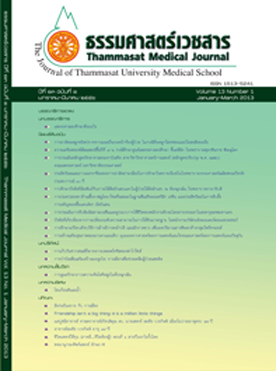Factors related to standard threshold shift in motor compressor workers
Keywords:
Standard threshold shift, Sound level, Motor compressor company, Noise-induced hearing loss.Abstract
Introduction: Noise is a ubiquitous physical hazard in a motor compressor factory. Workers are at risk of hearing loss.Standard threshold shift (STS) is one of the methods to study changes relative to the hearing baselinelevel of an average of 10 decibels (A) or more at 2,000, 3,000 and 4,000 hertz. STS could be helpful toscreen for hearing problems in workers.
Objective: To study the factors related to STS in workers in a motor compressor company.
Methods: A cross-sectional study was applied. Data was collected from March 2011 to April 2011 by selfadministeredquestionnaire. Noise levels in the workplace were monitored, and the employees audiogramresults from the last 2 years were used.
Results: Of the 464 workers who participated in the project, 51 (10.99%) demonstrated a change in STS. Workedin the factory for more than 14 years (OR = 3.84, 95%CI = 1.54-9.56), exposed to noise for a durationof more than 8 hours per day (OR = 2.12, 95%CI = 1.02-4.40) and did not use noise hearing protectionequipment (OR = 110.27, 95%CI = 10.62-1145.23) showed significant relationship with STS.
Conclusions: STS is a good tool for hearing screening test as it could be used to indicate workers who are at riskof hearing problem. Workers in a motor compressor company should use hearing protection equipmentto prevent noise-induced hearing loss in the future.
Key words: Standard threshold shift, Sound level, Motor compressor company, Noise-induced hearing loss.



